Recent Posts
The Power of Community at SERVPRO: A Great Place to Work
9/25/2023 (Permalink)
 Hardworking technicians standing together for a group picture.
Hardworking technicians standing together for a group picture.
Finding a workplace that values community and service can be a rare gem in a world driven by profit margins and bottom lines. One such gem is SERVPRO, a company renowned for its commitment to its employees and the communities it serves. Here, we explore the profound sense of community SERVPRO fosters and why it's undeniably a great workplace.
Purpose-Driven Mission
At the heart of SERVPRO's success is its unwavering commitment to helping people in their times of need. This purpose-driven mission forms the foundation of the SERVPRO community. Employees know that their work directly contributes to the well-being of others, instilling a deep sense of pride and fulfillment in their roles.
Teamwork and Collaboration
A thriving community is built on teamwork and collaboration, and SERVPRO exemplifies these values. Employees are encouraged to work together seamlessly to provide the best service to their clients. This culture of cooperation fosters a sense of unity among team members, creating a workplace where everyone feels valued.
Employee Development
SERVPRO understands that investing in the growth and development of its employees is essential for building a solid community. The company offers comprehensive training programs, advancement opportunities, and professional development support. This commitment to individual growth empowers employees to reach their full potential and contribute more effectively to the team.
Strong Leadership
Great communities are often led by exceptional leaders, and SERVPRO is no exception. The company's leadership prioritizes open communication, transparency, and accessibility. Employees feel heard and valued, creating a positive and inclusive work environment.
Recognition and Appreciation
In a community, it's essential to acknowledge and appreciate one another. SERVPRO understands this and regularly recognizes its employees' hard work and dedication. This recognition boosts morale and reinforces the idea that everyone is an integral part of the SERVPRO family.
In conclusion, SERVPRO's strong sense of community, driven by a purposeful mission, teamwork, employee development, exceptional leadership, community engagement, and recognition, makes it an exceptional place to work. When you join SERVPRO, you're not just joining a company; you're becoming a part of a community that cares deeply about its people and the world around them. If you're looking for a great place to work where you can make a meaningful impact, SERVPRO might be your perfect fit.
Emergency Mitigation Planning
7/18/2023 (Permalink)
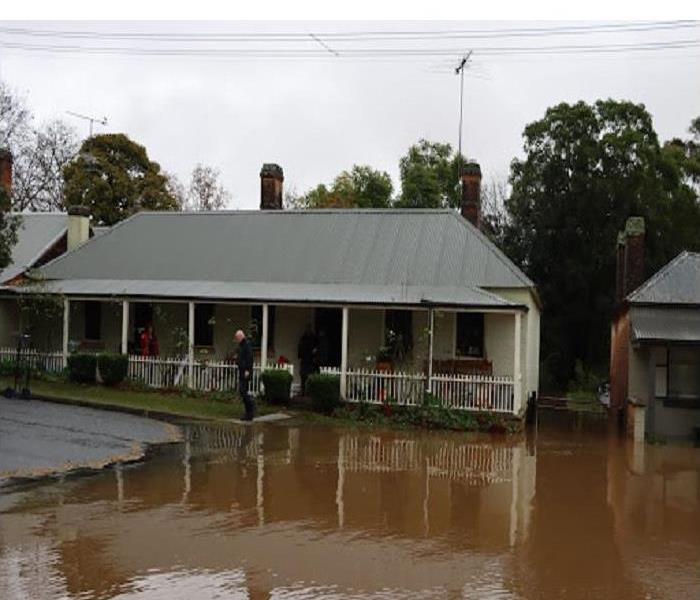 Be prepared for the next emergency
Be prepared for the next emergency
The Crucial Need for Emergency Mitigation Planning
In today's rapidly changing world, where natural disasters and unforeseen events are becoming more frequent and severe, it is crucial to recognize the importance of having a well-thought-out plan in case of emergencies. Whether it's a devastating earthquake, a destructive hurricane, or a global pandemic, a proactive strategy can significantly safeguard lives and minimize the impact on communities. This blog will highlight the significance of preparedness and the benefits it brings during times of crisis.
- Safety and Security: A well-crafted emergency plan ensures individual and community safety and security. It enables individuals to respond swiftly and effectively during a crisis, reducing panic and confusion. By outlining procedures for evacuation, communication, and emergency services, a plan provides reassurance, empowering people to take necessary actions to protect themselves and their loved ones.
- Minimizing Losses: Emergencies can result in significant economic and infrastructure losses. However, a robust plan reduces impact and speeds up recovery. By identifying potential risks, implementing preventive measures, and establishing contingency plans, individuals and organizations can mitigate the damage caused by emergencies. This proactive approach minimizes financial burdens and accelerates the restoration of normalcy.
- Effective Resource Allocation: During a crisis, resources such as food, water, medical supplies, and shelter become scarce. A well-prepared plan ensures these resources' effective allocation and utilization, preventing hoarding and ensuring equitable distribution. It enables authorities and organizations to identify vulnerable populations and prioritize their needs, fostering a more cohesive and compassionate response to emergencies.
- Adaptability and Future Readiness: In an ever-changing world, it is crucial to acknowledge that emergencies can take various forms. A comprehensive plan addresses existing risks and allows for adaptation and future readiness. By regularly reviewing and updating emergency protocols, individuals and organizations can stay ahead of emerging threats, evolving technologies, and changing environmental conditions, ensuring long-term resilience.
Preparing for emergencies is not an option but a necessity. A well-designed plan enables individuals and communities to respond effectively, ensuring all stakeholders' safety and security. By minimizing losses, allocating resources efficiently, and staying adaptable, we can navigate crises and emerge stronger than ever. Remember, the time to plan is now, as preparedness for today secures a better tomorrow. Let SERVPRO help you prepare for the worst-case scenario. We are here to help.
The Dangers of Mold Lurking in your Home
6/7/2023 (Permalink)
 Is Mold lurking in your home?
Is Mold lurking in your home?
Mold, an insidious intruder, can silently take hold in our homes, posing significant health risks and causing structural damage. Often overlooked or underestimated, mold growth can have far-reaching consequences for our well-being and the integrity of our living spaces. In this blog, we will delve into the dangers of mold found in a home. We will shed light on its potential health hazards and emphasize the importance of early detection and effective remediation.
Health Implications
Mold exposure can have serious implications for our health, particularly for individuals with respiratory conditions or weakened immune systems. Mold spores, when inhaled, can trigger allergic reactions, exacerbate asthma symptoms, and cause respiratory infections. Prolonged mold exposure can lead to more severe health issues like fungal infections, chronic sinusitis, and even neurological problems. Infants, older people, and those with compromised immune systems are particularly vulnerable to the adverse effects of mold.
Allergies and Respiratory Problems
Mold is a common allergen and can cause allergic reactions in susceptible individuals. Symptoms may include sneezing, coughing, watery eyes, and skin irritation. Moreover, mold releases volatile organic compounds (VOCs) into the air, irritating the respiratory system and leading to persistent coughing, wheezing, and shortness of breath. For individuals already living with respiratory conditions like asthma, mold can significantly worsen their symptoms, leading to frequent attacks and decreased quality of life.
Structural Damage
Beyond health implications, mold can wreak havoc on our homes. It thrives in damp environments and can grow on various surfaces, including walls, ceilings, floors, and even within insulation and ventilation systems. Over time, mold can weaken and deteriorate the materials it colonizes, compromising the building's structural integrity. It can cause warping, rotting, and decay, leading to costly repairs and potential safety hazards.
Mold is not merely an aesthetic issue; it poses significant dangers to our health and homes. Recognizing the risks of mold infestations emphasizes the importance of proactive measures such as moisture control, regular inspections, and prompt remediation. If you suspect mold growth in your home, call SERVPRO to assess and address the situation. Remember, early detection and effective mitigation are key to protecting your health, preserving your home's integrity, and ensuring a safe living environment for you and your loved ones.
The Importance of Fire Safety
6/7/2023 (Permalink)
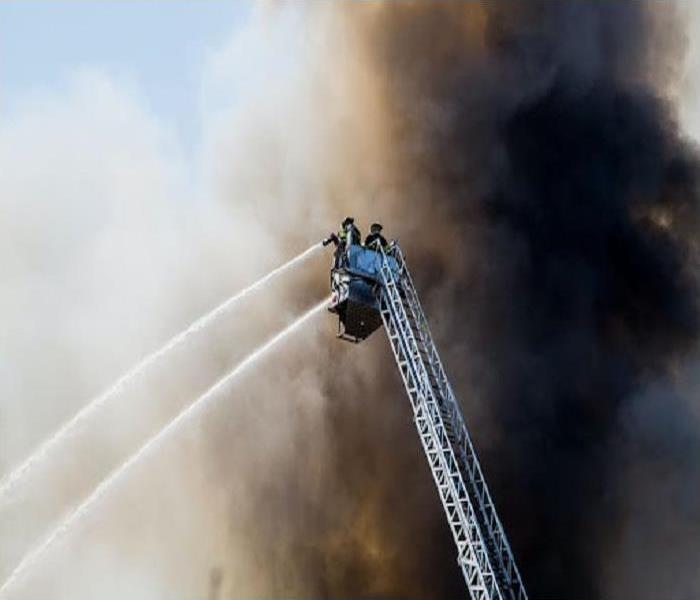 Minimize fire emergencies on your property
Minimize fire emergencies on your property
Fire, a powerful yet destructive force, can ravage homes, businesses, and lives within minutes. Understanding and prioritizing fire safety is not just a responsibility but a crucial step toward protecting ourselves, our loved ones, and our valuable possessions. In this blog, we will explore the paramount importance of fire safety and highlight key measures that can save lives and prevent devastating losses. We at SERVPRO want your home and business to be protected from fire threats. Let's look at some effective ways to stay safe.
Fire safety is most important for preserving human life. Fires can spread rapidly, engulfing entire structures and trapping individuals within them. Smoke inhalation and burns are major causes of fire fatalities. By implementing fire safety measures, such as installing smoke detectors, creating evacuation plans, and ensuring accessible fire exits, we enhance the chances of early detection, swift evacuation, and, ultimately, the survival of those in harm's way.
Fire can consume everything in its path, reducing years of hard work and cherished memories to ashes. By implementing fire safety measures, we protect our properties from extensive damage. This includes installing fire extinguishers, sprinkler systems, and fire-resistant materials. Regular maintenance of electrical systems, heating appliances, and cooking equipment is crucial to preventing fire outbreaks. Taking proactive steps to minimize fire risks significantly reduces devastating property loss.
For businesses, fire safety is not only about protecting physical assets but also ensuring business continuity. Fire incidents can disrupt operations, lead to significant financial losses, and damage a company's reputation. Implementing fire prevention strategies, conducting fire drills, and educating employees on fire safety protocols can minimize fire emergencies. By safeguarding the workplace, companies can continue to provide services, support employees, and maintain customer trust even in the face of adversity.
Fire safety should never be overlooked or underestimated. Fire safety is important because it can save lives, protect property, and ensure the continuity of businesses. By implementing preventative measures, staying vigilant, and educating ourselves and others, we can significantly reduce fire incidents. Remember, in case of fire, call the pros at SERVPRO. We will make it like it never even happened.
Flood Preparation for Commercial Buildings
8/20/2022 (Permalink)
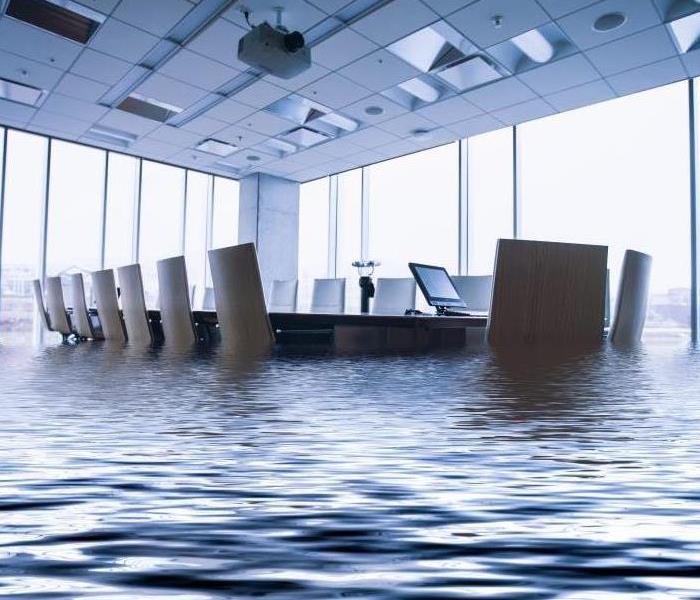 A flood can severely impact your business!
A flood can severely impact your business!
As far as natural disasters are concerned, flooding can be among the costliest. While you cannot always determine when a flood is going to happen, it is useful to take preventative measures. This will not only help keep your employees safe, but it will help protect your business and profit.
Contact a Mitigation Company
Have a mitigation company in mind before you end up with a flood on your hands. After a flood, it is better to have a professional service to call as soon as possible. They will be able to assess the damage done to your building and put forth a restoration plan. They will also be able to deal with dangerous black water. In contacting a professional, you are more likely to have your business up and running quickly.
Utilize Date and Cloud Backups
After the flooding occurs, you might not have time to save your electronics. While you may have time to elevate your computers and electronics, there is also a chance the flood waters could rise above them. Your computers store valuable information for your business, from important financial information to personal employee information. You should have a plan in place in case your computer systems are destroyed. Utilizing data and cloud backups allows you to have access to the information from anywhere.
Have a Continuity Plan
After a flood, your business may have to close for a length of time. It is good to have a continuity plan in place. You should determine what equipment is needed to keep your business running outside of the building. This could be as simple as answering phones or as complex as distributing your product. All of your important files should be located off-site as well.
You can't always stop flooding from occurring. However, you can make sure that despite extensive flood damage you can still restore your building, and continue with your business going forward.
16 firework safety tips!
7/19/2022 (Permalink)
 Make sure to keep a safe distance from your fireworks!
Make sure to keep a safe distance from your fireworks!
The National Council on Fireworks Safety’s (NCFS) mission is to educate the public on the safe use of fireworks and encourages consumers to follow the following safety tips before engaging in fireworks celebrations:
1. Obey all local laws regarding the use of fireworks.
2. Know your fireworks – Read the cautionary labels and performance descriptions before igniting.
3. A responsible adult should supervise all firework activities. Never give fireworks to children.
4. Alcohol and fireworks do not mix. Save your alcohol for after the show.
5. Wear safety glasses when shooting fireworks.
6. Light one firework at a time and then quickly move away.
7. Do not hold a fireworks item in your hand.
8. Use fireworks outdoors in a clear area; away from buildings and vehicles.
9. Never relight a “dud” firework. Wait 20 minutes and then soak it in a bucket of water before you discard it.
10. After purchasing fireworks, always store them in a cool, dry place.
11. When using fireworks always have a connected hose, bucket of water, or another water source nearby.
12. Never carry fireworks in your pocket or shoot them into metal or glass containers.
13. Do not experiment with homemade fireworks.
14. Dispose of spent fireworks by wetting them down and place them in a metal trashcan away from any building or combustible materials until the next day.
15. Ensure all pets and animals are away from fireworks noise.
16. With the rise in stress-related disorders affecting American servicemen and women pay special consideration to individuals who may be sensitive to loud noises in proximity to your fireworks show.
If you have any questions regarding how to properly use fireworks we encourage you to consult your local dealer.
About The National Council on Fireworks Safety – The National Council on Fireworks Safety is a nonprofit organization dedicated to educating the public about the safe and responsible enjoyment of consumer fireworks. For more information, visit http://www.fireworkssafety.org.
Stay safe this summer and 4th of July, and if a firework accident leaves your home with fire damage make sure to give us a call!
Campfire safety tips!
6/7/2022 (Permalink)
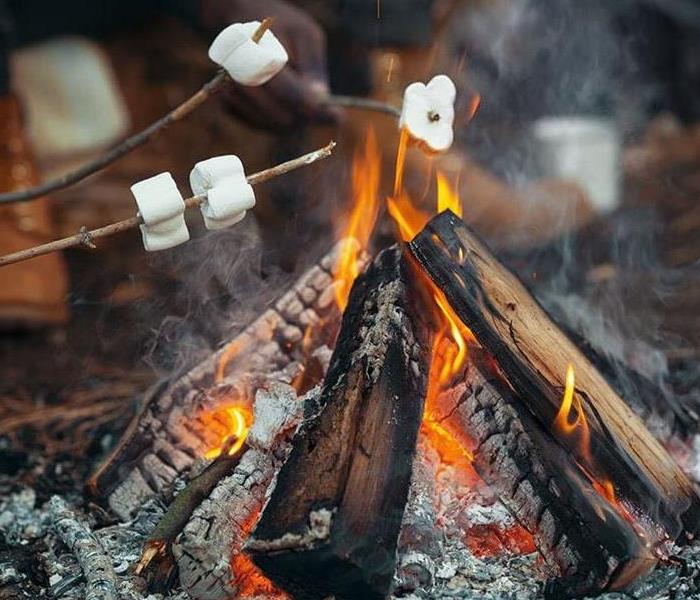 It's important to stay safe around the campfire!
It's important to stay safe around the campfire!
Having campfires and making smores are common summertime staples in the great state of Michigan! However, camp fires can quickly get out of hand if they are not monitored or properly managed. Here is a list of tips and tricks to keep in mind this summer while sitting around the campfire!
1. Be aware of your surroundings by making sure the campfire is set up away from dry grass and leaves. Dried out grass and leaves catch fire easily, and they spread fire quickly too. Also, make sure your campfire is far away from hanging free branches that could catch on fire.
2. Keep the size of the fire relatively small. Large fires are riskier, and pose a greater chance of getting out of control.
3. It’s always a good idea to keep a shovel and water close by when you’re having a campfire, so you can safely put the fire out when finished. According to smokeybear.com, to put a fire out, follow these steps: Pour lots of water on the fire, and drown ALL embers, not just the red ones. Pour water until hissing sound stops. With your shovel, scrape any remaining sticks and logs to remove any embers. Make sure that no embers are exposed and still smoldering. Continue adding water, dirt or sand and stir with a shovel until all material is cool. If it’s too hot to touch, it’s too hot to leave.
https://smokeybear.com/en/prevention-how-tos/campfire-safety/how-to-maintain-and-extinguish-your-campfire
4. If you are enjoying your fire at a campground or RV park, make sure to follow park rules for starting and putting out fires.
5. Never leave a campfire unattended.
6. Do not put anything other than wood into the fire.
7. Do not pull sticks out of the fire when blazing
8. Check out the weather before starting a campfire, and do not make one if the forecast shows wind. Wind can cause the fire to spread!
We hope that by sharing these tips, you will feel confident hosting a campfire for your friends and family! However, if fire damage does occur, we are here to help and are available 24 hours a day, 7 days a week. Enjoy the smores, everybody!
Emergency Ready Program (ERP)
5/27/2022 (Permalink)
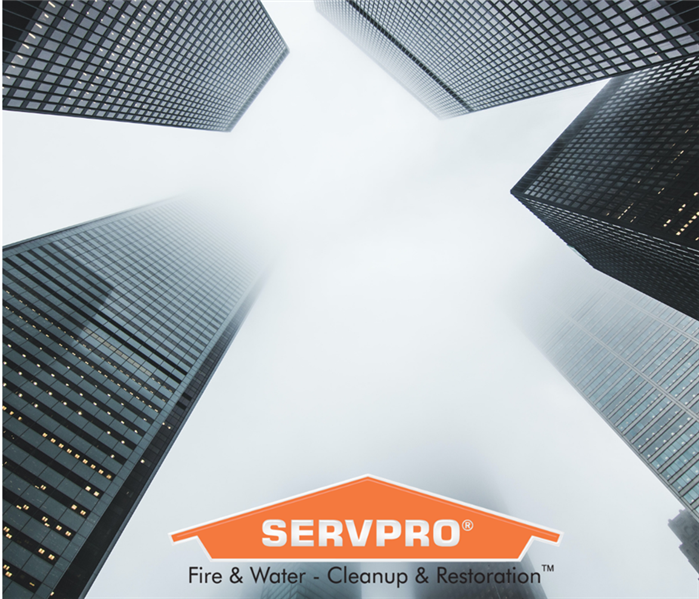 Is your business ready for a disaster?
Is your business ready for a disaster?
What is an ERP and how can it benefit your business in the event of an emergency?
ERP, which stands for "Emergency Ready Profile" is a service that SERVPRO provides and is 100% free! What's the catch you ask? That's the best part, there is no catch! We take your emergency needs very seriously in the event of a disaster, and with that comes a great sense of responsibility to get your business back up and running as soon as possible! The latest research shows that up to 50% of businesses close down following a disaster. The majority of businesses that survive have a readiness or preparedness plan in place. It's like having an insurance policy for your peace of mind. When your business is ready for whatever disaster may strike, no matter how your business was affected, your clients don't have to be.
Having a SERVPRO Emergency Ready Profile in place can greatly minimize interruptions to your business. When you know what to do in advance, the result is mitigation in a timely fashion. It can assist in limiting fire and water damage.
Having an Emergency Ready Profile in place is a simple process
We will come to you and do a no cost evaluation of your facility/business
This is a great value and is completely free to you!
A detailed document that contains crucial information required in case of an emergency
It will not take much time at all and should not disrupt your normal operations, but will save you valuable time if ever needed.
Instructions that will help you get back in to your facility as soon as possible
When you have an immediate plan of action it can greatly minimize the length at which your business is inactive
You have the premiere Fire & Water - Cleanup & Restoration company ready to spring into action
Confidence of knowing that an industry leader is close by and ready to serve you.
Establishes a chain of command authorizing work to begin
Crucial in saving time so we can begin work of mitigating the damage which in the end saves you money
Important details of your facility, where are all the shut-offs, areas of priority, and main contact information.
Having this information in place is crucial! Knowing where all the shut off valves are, areas of concern, and who to contact make all the difference in the world when disaster strikes!
Ready to put your "Emergency Ready Profile" In place? Give us a call!
(616) 647-4300
Why you should have a sump pump in your home!
5/16/2022 (Permalink)
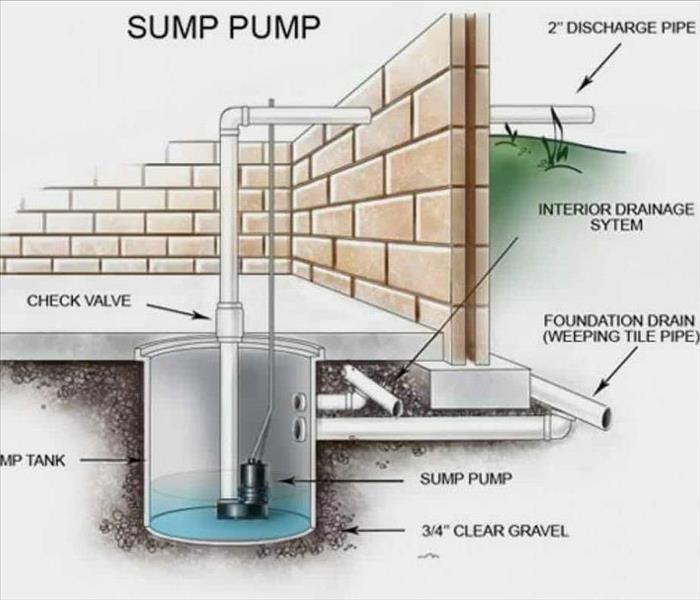 A helpful diagram of how a sump pump works in your home!
A helpful diagram of how a sump pump works in your home!
Dealing with water damage in your basement is no laughing matter. A home owners’ basement is an important part of their home. It can be used for a variety of reasons including an additional bedroom, a lounge area, and storage. Important items in your life can get damaged if you have a water loss down there.
One of the main things protecting your basement from water is your home's sump pump! You may not know what sump pump is and what its use in your home is. Here's some helpful information on what it is, and what it does!
What is a Sump Pump?
A sump pump is in charge of pumping water that enters your basement out of your home and into an area where it is safe to drain. The device sits in a "sump" which is a pit dug into the lowest point of your home, generally this is either the basement or a crawl space. When it rains the soil around your home becomes oversaturated. When excess groundwater funnels toward the sump pump and begins to fill with water, the pump activates and begins to remove the water from the pit.
Do I need a Sump Pump?
Many Michigan homes already have a sump pump installed. Sump pumps are recommended for homes that are in areas that receive heavy rain or snow, built on a flood-prone plot, or have had water issues in the past. A sump pump is also recommended for homes that have a finished basement. Even though they may not be high risk, it’s important to protect the livable area.
How often should I check my sump pump?
It is recommended you should check your sump pump every 3 to 4 months to ensure that it is working properly! This is very important for insurance purposes. On most standard home owner insurance policies water damage caused by sump pump failure isn't covered. You can add coverage for an additional cost, but if you aren't willing to go that route, regularly checking that your sump pump works is your best bet!
Dealing with water damage in your basement? Give us a call! (616) 647-4300
Fire extinguisher tips in the work place
4/19/2022 (Permalink)
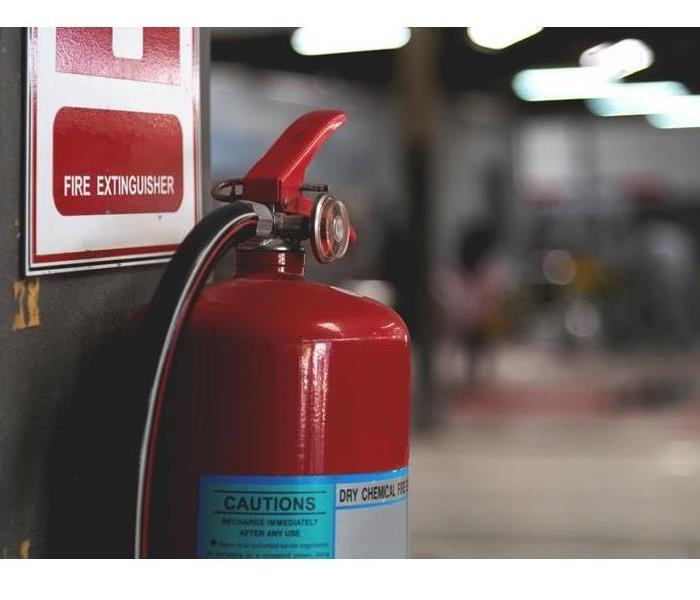 A fire extinguisher in the workplace!
A fire extinguisher in the workplace!
According to the Occupational Safety and Health Administration, the most common emergency small businesses must plan for is a fire. Fire extinguishers can be invaluable tools to help fight smaller fires in the workplace. Here are some tips on how and when to properly use a fire extinguisher!
Placement
There are certain legal requirements for fire extinguishers that every business has to follow. These rules can vary from state to state and city to city, so it's important to look up your local ordinances to ensure you're operating within fire code. There are general OSHA guidelines that require a fire extinguisher within 75 feet of locations where employees work, and one in stairwells.
Usage
When using a fire extinguisher it's important to remember the simple training technique, the PASS method.
P - Pull the pin on the extinguisher
A - Aim the hose nozzle low toward the base of the fire
S - Squeeze the handle to release the extinguishing agent
S - Sweep the nozzle from side to side at the base of the flames until extinguished.
Fire extinguishers are meant to handle only small fires. If a fire becomes too large, or the environment becomes too dangerous, employees should know when and how to evacuate the area safely; and if appropriate, sound the fire alarm or call the fire department immediately.
Dealing with fire damage in your business? Give us a call! (616) 647-4300






 24/7 Emergency Service
24/7 Emergency Service








